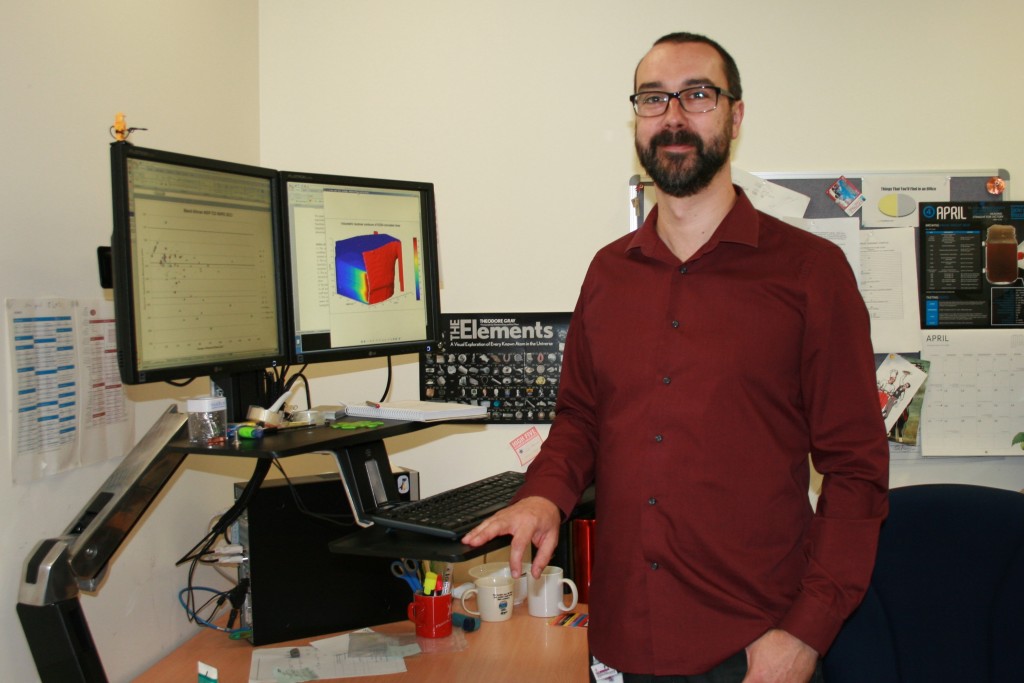This is the second profile article based upon interviews with three staff members from the Medical Technology and Physics Department at Perth’s Sir Charles Gairdner Hospital.
This article will be on Medical Physicist Steven Crossley.
Steven has a Bachelor in Physics and Chemistry with joint Honours from the University of Manchester and a Master’s in “The Physics and Technology of Nuclear Reactors” from the University of Birmingham. He is also close to completing a Master of Physics: Medical Physics at The University of Western Australia and is pursuing a certification from the ACPSEM (Australasian College of Physical Scientists and Engineers in Medicine).
This impressive list of credentials happened somewhat by chance. While studying, Steven was unable to decide between physics or chemistry honours and so decided to do both of them. The master’s degree was decided upon when he was handed a flyer while walking through his university campus. He was interested in the promise of the degree’s high employment rates and convinced when he realised that it would allow him to spend another year at university.
From university, he started working with nuclear reactors in the United Kingdom’s nuclear power industry. But, when he moved to Australia in 2002, this experience was not transferrable.
“I didn’t have the experience in necessary jobs… it took me six months to find work.”
After a brief period working in building sites, Steven got a job working with Radiation Health, Western Austalia’s radiation regulator. Though it was somewhat a “thankless task” being responsible for ensuring people adhered to radiation safety regulations, it provided him with experience with x-ray compliance testing and knowledge of radiation regulations. This led him to his current job as a Medical Physicist in Charles Gairdner’s Medical Technology and Physics Department (MTP). Over his eight years in the department Steven has been progressing to more of a supervisory role.
An aspect of Steven’s job is to work with I131 patients; people with thyroid cancer. For this treatment the thyroid is removed surgically, but the patient must also take a tablet containing radioactive iodine (I131) following the treatment. As the thyroid absorbs iodine, this means that any remaining thyroid tissue can be eradicated non-surgically. These patients must be kept in isolation because all their bodily wastes and secretions are radioactive for a period of time. Steven is responsible for limiting iodine contamination, dealing with cleanup and communicating the risks.
As well as working in MTP, he is also doing a part-time secondment with the hospital’s Nuclear Medicine department. It is a varied job that he very much enjoys.
“You’re modelling [data] one day, or you’re running around talking to people… sometimes you’re cleaning toilets.”
Talking to people generally requires communicating risk and educating patients, families and the doctors so that all are aware of the safety precautions required for handling radiation. However, as radiation can be presented quite negatively in the media, Steven often has to reassure people that radiation isn’t as dangerous as they believe it to be. He instead encourages them to exercise caution and educates them on how to conduct themselves in public while they are still somewhat radioactive.
Steven’s department also deals with the radiation badges that must be worn by hospital personnel that work with radiation. They then analyse the data to determine if anyone has been exposed to unsafe levels of radiation.
“People that are most at risk adhere best to precautions… people who don’t work regularly with radiation who have other critical tasks to attend to aren’t so good.”
Steven finds that the most interesting aspect of his job is the people that he has come across.
“Some you remember because of the wonderful people and the horrible cases. It’s good to help where you can…I’m still learning things regularly, medical stuff in particular.”
Interacting with people is also the most enjoyable aspect of Steven’s job. He particularly enjoys working with the people in his department and appreciates how they “help each other out”. His favourite aspects of the job are educating people and having the opportunities to solve problems.
If he were to ‘do it again’, Steven says that he would have made his life easier and fulfilled the ACPSEM certification requirements bit by bit, rather than having to go through years of work in a short period of time. Besides that, he is happy with his job and situation
“Though the first year after emigrating was hard, I never doubted that it was the right thing.”
To students interested in medical physics, he recommends that they try to “spend some time in one of the three medical physics specialties”: Radiation Oncology Physics, Nuclear Medicine Physics or Radiology Medical Physics.
We wish Steven Crossley best of luck with his Master of Physics: Medical Physics and thank him for taking the time to conduct this interview.




1 Comment
It’s really a nice and useful piece of information. I’m satisfied that you just shared this useful information with us.
Please keep us informed like this. Thank you for sharing.